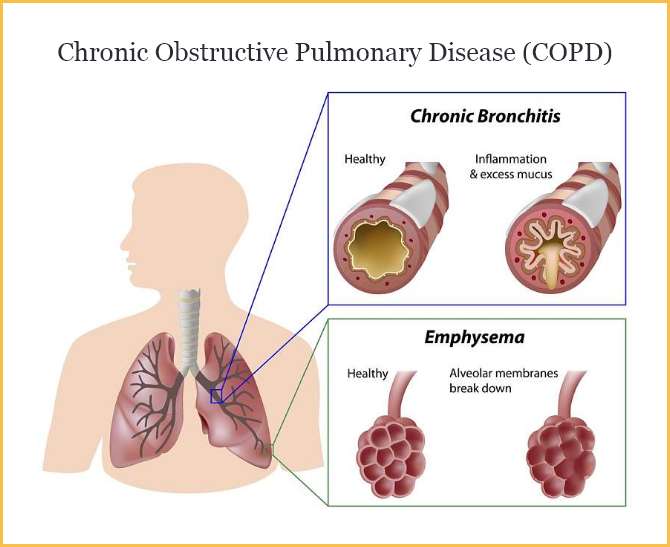
What is COPD?
A chronic inflammatory lung condition called COPD results in restricted lung airflow. It is a chronic lung ailment that makes breathing challenging.
2 Important components of COPD are:
Your bronchial tubes become inflamed and narrowed in this disease, and your lungs generate more mucus, which can further block the narrowed tubes.
The brittle walls and elastic fibres of the alveoli are destroyed by this lung condition. When you exhale, small airways constrict, obstructing the passage of air from your lungs.
Signs & Symptoms
The symptoms of COPD frequently do not manifest until serious lung damage has already occurred, and they typically get worse over time, especially if smoking exposure persists.
COPD signs and symptoms may include:
Breathlessness
Wheezing & Frequent respiratory infections
Discomfort in chest
Chronic Cough with sputum (mucus)
Unintended weight loss
Lack of energy
Breathlessness
Wheezing & Frequent respiratory infections
Discomfort in chest
Chronic Cough with sputum (mucus)
Unintended weight loss
Lack of energy
What are the risk factors of COPD?
COPD Risk factors include:
- Tobacco smoke exposure. Long-term cigarette smoking is the main risk factor for COPD. The more years you smoke and the more packs you smoke, the greater your risk.
- People with asthma. The chronic inflammatory airway illness asthma may increase the risk of getting COPD. Smoking and asthma together significantly raise the risk of developing COPD.
- Occupational Exposure to chemicals and dust. Your lungs can get irritated and inflamed from prolonged exposure to chemical fumes, vapours, and dusts at work.
- Exposure to fumes from burning fuel. People in the developing world are more likely to develop COPD if they are exposed to the fumes from burning fuel for cooking and heating in poorly ventilated homes.
- Some cases of COPD are caused by the unusual genetic condition alpha-1-antitrypsin deficiency. Some smokers are possibly more prone to the disease due to additional genetic concerns.
How is COPD diagnosed?
COPD is commonly misdiagnosed. Many COPD sufferers might not be diagnosed until their condition is advanced. Your doctor will examine your signs and symptoms, go over your past medical and family history, and inquire about any exposure you may have had to lung irritants, especially cigarette smoke. To diagnose your problem, your doctor may request a number of tests. Tests may include lung (pulmonary) function tests, chest X-ray, CT scan, and laboratory tests.
How to prevent COPD?
COPD frequently has a clear cause and a clear course of prevention, also there are techniques to limit the disease’s progression. The majority of instances are directly caused by smoking, so the best method to avoid developing COPD is to never smoke or to quit doing so right away.
Talk to your Doctor about annual flu vaccination and regular vaccination against pneumococcal pneumonia to reduce your risk of or prevent some infections.
What are the complications that COPD will lead to?
COPD can cause many complications, including:
-
Respiratory infections
-
Heart problems
-
Lung cancer
-
High blood pressure in lung arteries
-
Depression
Treatment of COPD
Inhalers and tablets
Inhalers and tablets to help make breathing easier
Pulmonary rehabilitation
Pulmonary rehabilitation – a specialised programme of exercise and education
Stop Smoking
if you have COPD and you smoke, this is the most important thing you can do
Surgery or a lung transplant
Surgery or a lung transplant – although this is only an option for a very small number of people
A doctor will discuss the various treatment options with you.

